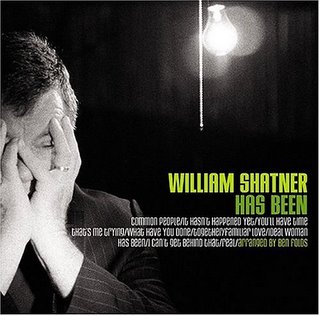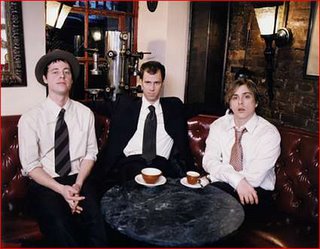But ol' Folds married an Aussie and moved Down Under (they grow the best women down there, don'tcha know), leaving his band and country behind. He continued to pump out great material -- a couple of solo albums, a live album, various online-only EPs, singles, experiments, and weirdness (the Three Bens,
Which is fine by me, although I would like to see him do a follow up to his "Fear of Pop, Volume 1" brilliant space oddity album that featured your favorite actor and mine, William Shatner.
(Actually, Ben Folds produced and played on William Shatner's crowning musical achievement, Has Been in 2004, so let's not stress, eh? And while I'm on the subject, I should say, in all earnestness, that Has Been is staggering. Grand. Magnifico. Just listen to the first track -- a Shatner duet with pop-punk icon Joe Jackson, covering Pulp's "Common People" -- and try not to dance like a madman, even if you loath Star Trek. It's that damn good. Listen to it with headphones for pure stereophonic bliss. Even the Pitchfork snobs are in awe.)

Still, I sometimes wonder what happens to the less famous members of eponymous bands when their fearless front men go off on their own. What happened to the Stooges in those years without Iggy Pop? Where went the Attractions and the Revolution without Elvis Costello and Prince? And what happened to the two men who weren't Ben Folds that helped make up the Ben Folds Five trio?
 That last question I can kinda answer: bassist Robert Sledge moved back to North Carolina where he's supposedly playing with a couple of different bands and helping produce local acts; at one point he belonged to Nut Magnet with ex-Squirrel Nut Zippers Tom Maxwell and Ken Mosher; later he joined International Orange as a bassist-songwriter (alongside musicians Snuzz, Django Haskins, and Jason Fagg), but that band broke up in 2004. Drummer Darren Jessee has formed a smooth new band of his own, the Hotel Lights: the band is obscure right now, but their songs are kinda catchy. If you like Ben Folds and mellow indie guitar pop, then you'll dig the Hotel Lights.
That last question I can kinda answer: bassist Robert Sledge moved back to North Carolina where he's supposedly playing with a couple of different bands and helping produce local acts; at one point he belonged to Nut Magnet with ex-Squirrel Nut Zippers Tom Maxwell and Ken Mosher; later he joined International Orange as a bassist-songwriter (alongside musicians Snuzz, Django Haskins, and Jason Fagg), but that band broke up in 2004. Drummer Darren Jessee has formed a smooth new band of his own, the Hotel Lights: the band is obscure right now, but their songs are kinda catchy. If you like Ben Folds and mellow indie guitar pop, then you'll dig the Hotel Lights.I've written the following Hotel Lights article with a friend of mine. We plan on posting it to Wikipedia later, and Wikipedia can claim all rights to it... but you, dear readers, get the first look:
Hotel Lights
Indie pop band Hotel Lights was founded by Darren Jessee in 2003 (approximately) in Chapel Hill, North Carolina -- the city where, not coincidentally, Ben Folds Five originally formed in 1994 as a trio consisting of Jessee, songwriter-pianist Ben Folds, and bassist Robert Sledge, along with various songwriting partners.
Jessee, the drummer and one of the principal songwriters for Ben Folds Five, initially pursued a solo career as a singer-songwriter in New York City after BFF broke up in 2000. However, seeking to flesh out the material that he'd been developing on his own, he then decided to create a full-fledged band, Remover, which was quickly renamed Hotel Lights.
On the band's website, Jessee obliquely describes the concept behind the band's name by saying, "...when you see hotel lights in the distance you feel like 'yeah, I'm almost there', but when you stand in the bathroom and turn on the hotel lights, they are fluorescent and you see every scar."
The band's original lineup consisted of Jessee on lead vocals and guitar, former Archers of Loaf drummer Mark Price on drums, Roger Gupton on bass and vocals, and Chris Badger playing keyboards and guitar. Sound engineer Alan Weatherhead (The Comas, Sparklehorse, Camper Van Beethoven, Mary Timony) recorded the band's first album and their follow-up EP; he also performs pedal steel and guitar with Hotel Lights on occasion. Adam Schlesinger (Fountains of Wayne) and others have also made sonic contributions.
As of 2005, the band had not been signed by a major label and was distributing their albums primarily through indie music retailer CD Baby, which files the band under the heading of "alt pop songs, acoustic guitar, lush keyboards." The official band website draws comparisons between Hotel Lights and Nick Drake, Court and Spark, and The Band.
Hotel Lights had its first full-length release in the autumn of 2004. The self-titled album -- recorded at Sound of Music studios in Richmond, VA -- contained the following tracks (all copyrighted by Hair Sucker Songs):
1. You Come and I Go
2. A.m. Slow Golden Hit
3. Miles Behind Me
4. I Am a Train
5. Small Town Shit
6. What You Meant
7. Follow Through
8. Stumblin' Home Winter Blues
9. Marvelous Truth
10. The Mumbling Years
11. Anatole
12. Motionless
13. Love to Try
Related Links:
Official Hotel Lights band page
CD Baby Hotel Lights band page
Chris Parker's Independent Weekly "Homebrew" album review
Jason Warburg's Daily Vault album review
Darren Jessee's home page
Kitchen Mastering studios discusses the mastering of the 2005 Hotel Lights EP
Darren Jessee info is revealed in "Joey's Guide to Ben Folds Five B-Sides and Rarities"
Done Waiting's Darren Jessee update, "What's Up, Darren Jessee, Former Drummer of Ben Folds Five?"
Info on the lost Ben Folds/Darren Jessee collaboration, "Wandering," now part of the Ben Folds Speed Graphic EP.



